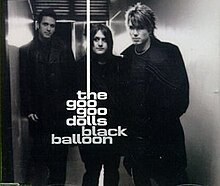
"I'll Be There for You" is a song by American pop rock duo the Rembrandts. The song was written by David Crane, Marta Kauffman and Allee Willis as the main theme song to the NBC sitcom Friends, which was broadcast from 1994 to 2004. American rock band R.E.M. was originally asked to allow their song "Shiny Happy People" to be used for the Friends theme, but they turned the opportunity down. "I'll Be There for You" was subsequently written and Warner Bros. Television selected the only available band on Warner Bros. Records to record it: the Rembrandts. In 1995, after a Nashville radio station brought the song to mainstream popularity, Rembrandts members Danny Wilde and Phil Sōlem expanded the theme song with two new verses and included this version on their third studio album, L.P. (1995).
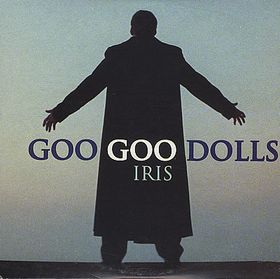
"Iris" is a song by the American alternative rock band Goo Goo Dolls. Written for the soundtrack of the 1998 film City of Angels, it was included on the sixth Goo Goo Dolls album, Dizzy Up the Girl, and released as a single on April 1, 1998. No character named Iris appears in the film, and the song title is not heard in the lyrics.

"One Week" is a song by Canadian rock band Barenaked Ladies released as the first single from their 1998 album, Stunt. It was written by Ed Robertson, who is featured on the lead vocal of the rapped verses. Steven Page sings lead on the song's chorus, while the two co-lead the prechoruses in harmony. The song is notable for its significant number of pop culture references and remains the band's best-known song in the United States, where it topped the Billboard Hot 100. Coincidentally, when the song reached No. 1 on the Billboard Hot 100, it remained in the top spot for one week.

"Sweetest Thing" is a song by Irish rock band U2. It was originally released as a B-side on the "Where the Streets Have No Name" single in 1987. The song was later re-recorded and re-released as a single in October 1998 for the band's compilation album The Best of 1980–1990.

"Smooth" is a song performed by American rock band Santana and Rob Thomas of Matchbox Twenty, who sings the lead vocals. It was released to radio on June 15, 1999, as the lead single from Santana's 1999 studio album, Supernatural. It was physically released as a single in August. It was written by Itaal Shur and Thomas, who re-wrote Shur's original melody and lyrics, and produced by Matt Serletic.

"The Way" is a song by American alternative rock band Fastball. It was released on January 7, 1998, as the lead single from their second studio album, All the Pain Money Can Buy (1998). The song was written by the band's lead vocalist, Tony Scalzo, and was produced by the band and Julian Raymond. Scalzo was inspired to write the song after reading about the disappearance of an elderly couple who were found dead in their car many miles away from their intended destination.
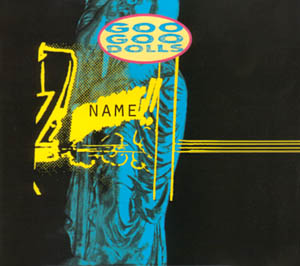
"Name" is a song by American rock band Goo Goo Dolls. It was released in September 1995 as the third single from their fifth studio album, A Boy Named Goo (1995). "Name" became the band's first major hit, topping both the US Modern Rock Tracks chart and the Album Rock Tracks chart. It also reached number five on the Billboard Hot 100. In Canada, "Name" peaked at number two on the RPM 100 Hit Tracks chart and number one on the RPM Alternative 30.

"Take a Picture" is a song by American rock band Filter, released to radio in September 1999 as the second single from their second studio album, Title of Record (1999). The song became a hit at the start of 2000 following its January 18 retail release, peaking at number 12 on the US Billboard Hot 100 and number three in Canada. It also became a top-10 hit in New Zealand, peaking at number eight on the RIANZ Singles Chart.

"Everyday Is a Winding Road" is the second single from American singer and songwriter Sheryl Crow's 1996 eponymous album. Neil Finn, lead singer of Crowded House, provides backing vocals. Paul Hester, another member of Crowded House, was the inspiration for the song. The single was issued in the United Kingdom in November 1996 and was released in the United States the following year.

"If It Makes You Happy" is a song by American singer-songwriter Sheryl Crow, released as the lead single from her 1996 eponymous album in September 1996. The song peaked at number 10 on the US Billboard Hot 100, becoming Crow's final top-10 solo hit in the United States, and at number nine on the UK Singles Chart. It also reached number one in Canada and won Best Female Rock Vocal Performance at the 1997 Grammy Awards. In 2003, Q Magazine ranked "If It Makes You Happy" at number 663 in their list of the "1001 Best Songs Ever".

"Slide" is a song by American alternative rock group Goo Goo Dolls. It was released as the first single from their sixth studio album, Dizzy Up the Girl, in September 1998. According to lead guitarist John Rzeznik, the song is about a Catholic girl who becomes pregnant and discusses with her boyfriend how they should respond to it. Musically, the track is a jangle pop and alternative rock song.

"3AM" is the third single and the third track from American rock band Matchbox 20's debut album, Yourself or Someone Like You (1996). Written by Rob Thomas, Jay Stanley, John Leslie Goff, and Brian Yale, the song was inspired by Thomas dealing with his mother's cancer as a teenager. The song was officially serviced to US modern rock radio in October 1997 and was given a commercial release outside North America the following month.
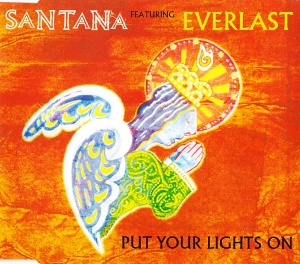
"Put Your Lights On" is a song by American rock band Santana and American musician Everlast from Santana's 18th studio album, Supernatural (1999). Serviced to US rock radio in August 1999, the song peaked at number 18 on the Billboard Bubbling Under Hot 100 and number eight on the Billboard Mainstream Rock Tracks chart. "Put Your Lights On" won a Grammy Award for Best Rock Performance by a Duo or Group with Vocal at the 42nd Annual Grammy Awards.

"Every Morning" is a song by American rock band Sugar Ray, released as the lead single from their third studio album, 14:59 (1999). The track is an alternative rock and flamenco pop song that references Malo's "Suavecito" and Hugh Masekela's "Grazing in the Grass". Serviced to US radio in December 1998, "Every Morning" was released in Japan in January 1999 and in the United States two months later, making it Sugar Ray's first commercially available single in the US.

"Lullaby" is a song by American rock singer Shawn Mullins from his fourth studio album, Soul's Core (1998). It was released in August 1998 and is Mullins' most successful song to date, reaching number one on the US Billboard Adult Top 40, number seven on the Billboard Hot 100, and number nine on the Billboard Modern Rock Tracks chart. It also found success abroad, reaching number nine on the UK Singles Chart, number five in Australia, and number two in Canada. The song has appeared on 32 different releases including the original album, Soul's Core, greatest hits albums, 1990s compilations and acoustic compilations.
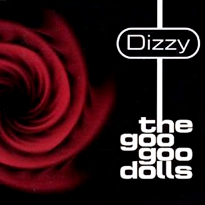
"Dizzy" is a song by American band Goo Goo Dolls, written by lead vocalist and guitarist Johnny Rzeznik. It was released as a single from their sixth studio album, Dizzy Up the Girl (1998), in February 1999. In Japan, an extended play (EP) titled Dizzy EP was released featuring this song as well as others from previous albums. "Dizzy" peaked at number nine on the US Billboard Modern Rock Tracks chart in May 1999 and also reached number 28 in Canada and number 50 in Australia. The single's music video stars actress Shannyn Sossamon.
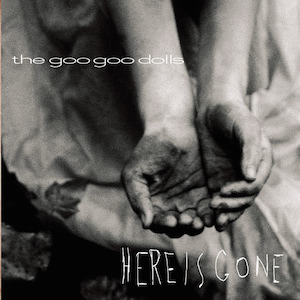
"Here Is Gone" is a song by American rock band Goo Goo Dolls. A song about yearning for a deeper relationship with someone, "Here Is Gone" was released on March 11, 2002, as the lead single from the band's seventh studio album, Gutterflower (2002). It reached number 18 on the US Billboard Hot 100 chart and number three on the Adult Top 40. The single also reached number 17 in New Zealand, becoming the group's second top-20 hit there.

The discography of American alternative rock band Goo Goo Dolls consists of 14 studio albums, five live albums, seven compilation albums, nine EPs, 38 singles, one video album, and 43 music videos.

"Someday" is a song by American rock band Sugar Ray. First serviced to American radio in June 1999, the song was released on September 7, 1999, as the second US single and third single overall from the band's third album, 14:59 (1999). The song reached number seven on both the US Billboard Hot 100 and Billboard Modern Rock Tracks charts, number four on Canada's RPM 100 Hit Tracks chart, and number 25 in New Zealand.

"Broadway" is a song recorded by the Goo Goo Dolls. The song was released in March 2000 as the last single from their sixth studio album, Dizzy Up the Girl (1998). Although not as popular as the albums previous singles "Iris" and "Slide", the song entered the top 30 in the United States, peaking at number 24 on the Billboard Hot 100 and coming in at number 84 on the Billboard year-end Hot 100 singles of 2000. The single also peaked number seven on the Canadian RPM 100 Hit Tracks chart and number six on the Icelandic Singles Chart.
